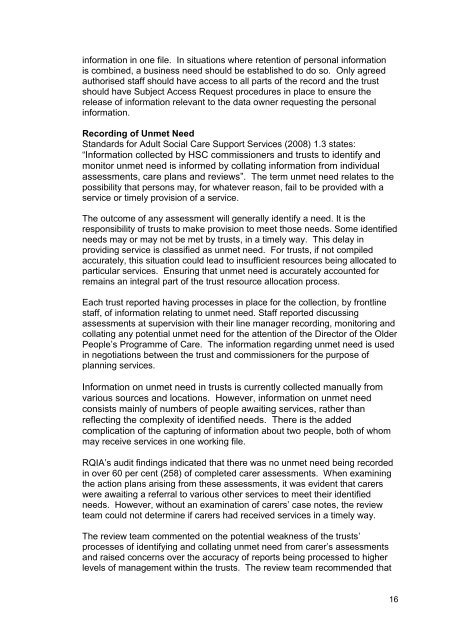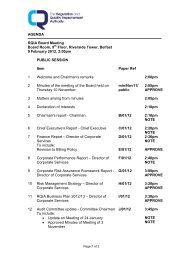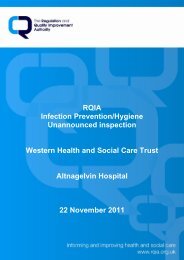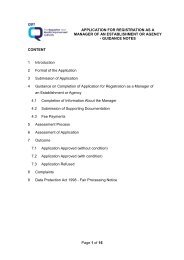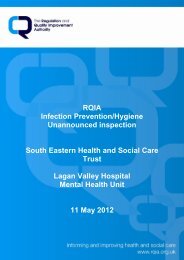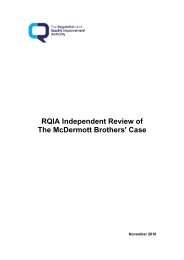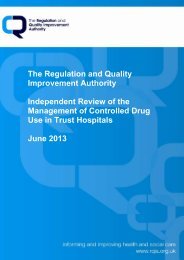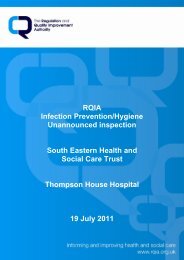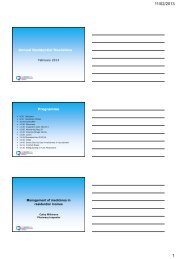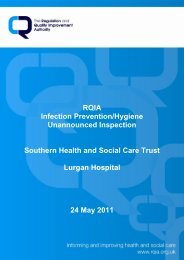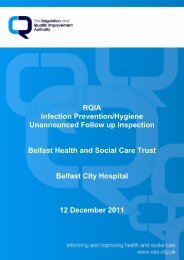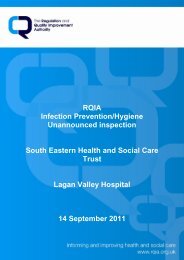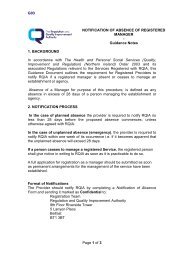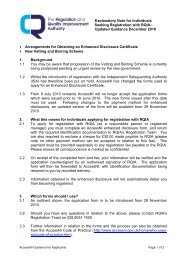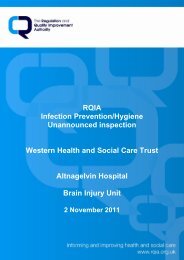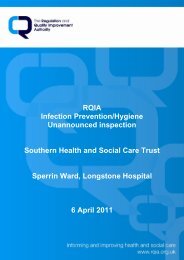Review of the Implementation of the Northern Ireland Single ...
Review of the Implementation of the Northern Ireland Single ...
Review of the Implementation of the Northern Ireland Single ...
You also want an ePaper? Increase the reach of your titles
YUMPU automatically turns print PDFs into web optimized ePapers that Google loves.
information in one file. In situations where retention <strong>of</strong> personal information<br />
is combined, a business need should be established to do so. Only agreed<br />
authorised staff should have access to all parts <strong>of</strong> <strong>the</strong> record and <strong>the</strong> trust<br />
should have Subject Access Request procedures in place to ensure <strong>the</strong><br />
release <strong>of</strong> information relevant to <strong>the</strong> data owner requesting <strong>the</strong> personal<br />
information.<br />
Recording <strong>of</strong> Unmet Need<br />
Standards for Adult Social Care Support Services (2008) 1.3 states:<br />
“Information collected by HSC commissioners and trusts to identify and<br />
monitor unmet need is informed by collating information from individual<br />
assessments, care plans and reviews”. The term unmet need relates to <strong>the</strong><br />
possibility that persons may, for whatever reason, fail to be provided with a<br />
service or timely provision <strong>of</strong> a service.<br />
The outcome <strong>of</strong> any assessment will generally identify a need. It is <strong>the</strong><br />
responsibility <strong>of</strong> trusts to make provision to meet those needs. Some identified<br />
needs may or may not be met by trusts, in a timely way. This delay in<br />
providing service is classified as unmet need. For trusts, if not compiled<br />
accurately, this situation could lead to insufficient resources being allocated to<br />
particular services. Ensuring that unmet need is accurately accounted for<br />
remains an integral part <strong>of</strong> <strong>the</strong> trust resource allocation process.<br />
Each trust reported having processes in place for <strong>the</strong> collection, by frontline<br />
staff, <strong>of</strong> information relating to unmet need. Staff reported discussing<br />
assessments at supervision with <strong>the</strong>ir line manager recording, monitoring and<br />
collating any potential unmet need for <strong>the</strong> attention <strong>of</strong> <strong>the</strong> Director <strong>of</strong> <strong>the</strong> Older<br />
People‟s Programme <strong>of</strong> Care. The information regarding unmet need is used<br />
in negotiations between <strong>the</strong> trust and commissioners for <strong>the</strong> purpose <strong>of</strong><br />
planning services.<br />
Information on unmet need in trusts is currently collected manually from<br />
various sources and locations. However, information on unmet need<br />
consists mainly <strong>of</strong> numbers <strong>of</strong> people awaiting services, ra<strong>the</strong>r than<br />
reflecting <strong>the</strong> complexity <strong>of</strong> identified needs. There is <strong>the</strong> added<br />
complication <strong>of</strong> <strong>the</strong> capturing <strong>of</strong> information about two people, both <strong>of</strong> whom<br />
may receive services in one working file.<br />
RQIA‟s audit findings indicated that <strong>the</strong>re was no unmet need being recorded<br />
in over 60 per cent (258) <strong>of</strong> completed carer assessments. When examining<br />
<strong>the</strong> action plans arising from <strong>the</strong>se assessments, it was evident that carers<br />
were awaiting a referral to various o<strong>the</strong>r services to meet <strong>the</strong>ir identified<br />
needs. However, without an examination <strong>of</strong> carers‟ case notes, <strong>the</strong> review<br />
team could not determine if carers had received services in a timely way.<br />
The review team commented on <strong>the</strong> potential weakness <strong>of</strong> <strong>the</strong> trusts‟<br />
processes <strong>of</strong> identifying and collating unmet need from carer‟s assessments<br />
and raised concerns over <strong>the</strong> accuracy <strong>of</strong> reports being processed to higher<br />
levels <strong>of</strong> management within <strong>the</strong> trusts. The review team recommended that<br />
16


